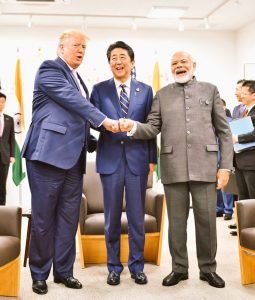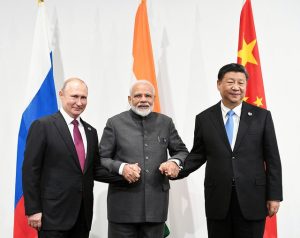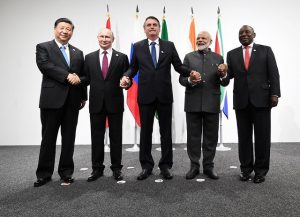
OSAKA: JAI Ho! Amid sharpening power games in the region, India engaged in a smart diplomatic balancing act by holding two separate set of trilateral meetings with the leaders of Japan and America (JAI), and with the leaders of Russia and China (RIC).
Prime Minister Narendra Modi’s second day in Osaka began with a trilateral JAI meeting with US President Donald Trump and Japan’s Prime Minister Shinzo Abe. The JAI trilateral summit focused on shaping an inclusive Indo-Pacific to promote infrastructure development and connectivity in the region. The smiling faces of the three leaders underscored growing comfort level and convergence of perspectives among like-minded democracies. In his remarks, PM Modi highlighted “the importance India attaches to” the grouping.
“Committed to a better future. Meeting of JAI (Japan-America-India)Trilateral takes place in Osaka. PM @AbeShinzo welcomes the leaders. @POTUS congratulates Prime Ministers Modi and Abe for their electoral victories. PM Modi highlights the importance India attaches to JAI,” the prime minister’s office tweeted.
“Today’s meeting of the JAI Trilateral was a productive one. We had extensive discussions on the Indo-Pacific region, improving connectivity and infrastructure development. Grateful to PM @AbeShinzo and President @realDonaldTrump for sharing their views as well,” Mr Modi tweeted.
 Later in the day, PM Modi held the trilateral RIC meeting with Russia’s President Vladimir Putin and China’s President Xi Jinping which focused on defending and promoting a rules-based international trading order and reformed multilateralism. Issues relating to enhanced counter-terror cooperation and climate change also figured in discussions.
Later in the day, PM Modi held the trilateral RIC meeting with Russia’s President Vladimir Putin and China’s President Xi Jinping which focused on defending and promoting a rules-based international trading order and reformed multilateralism. Issues relating to enhanced counter-terror cooperation and climate change also figured in discussions.
“As the world’s leading economies, exchange of views between us, on the economic, political and security situation of the world is important. Our trilateral meeting today is a useful medium for discussing and coordinating on major global issues,” said Mr Modi.
BRICS of New World Order

Symbolizing India’s policy of multi-alignment, a meeting of the leaders of BRICS countries was also held on the sidelines of the G20 summit. “One-sided decision and rivalry are dominating over rules based multilateral international trade systems. On the other hand, the lack of resources is reflected in the fact that there is an estimated deficit of $ 1.3 trillion for investing in infrastructure development of emerging market economies,” said Mr Modi.
“The synergy between BRICS countries can lead, to some extent, to the resolution of the side effects of unilateral decisions. We have to keep on emphasizing for reformed multilaterism in international financial and business institutions and organizations for the necessary reforms. For sustained economic growth the required resources such as oil and gas are needed to be constantly available at low prices,” he said.
These separate mini-lateral summits crystallized and showcased India’s policy of forging issues-based alignments with like-minded countries and major power centres, without getting into us versus them zero sum games.
(Manish Chand is CEO & Editor-in-Chief, India Writes Network and India and the World magazine. He is in Osaka, Japan, to report on and analyse India’s Prime Minister Narendra Modi’s visit for the G20 summit of the world’s leading economies. Follow him on twitter@ scepticcryptic)
Author Profile

- Manish Chand is Founder and Editor-in-Chief of India Writes Network (www.indiawrites.org) and India and World, a pioneering magazine focused on international affairs. He is CEO, Centre for Global India Insights, an India-based think tank focused on global affairs.
Latest entries
 India and the WorldFebruary 17, 2026South-by-South: Focus on people-centric solutions at India AI summit
India and the WorldFebruary 17, 2026South-by-South: Focus on people-centric solutions at India AI summit India and the WorldFebruary 7, 2026Modi hails interim India-US trade deal, Goyal says no concessions made on agriculture
India and the WorldFebruary 7, 2026Modi hails interim India-US trade deal, Goyal says no concessions made on agriculture India and the WorldFebruary 2, 2026Trump announces trade deal with India, Modi ‘delighted’
India and the WorldFebruary 2, 2026Trump announces trade deal with India, Modi ‘delighted’ India and the WorldJanuary 31, 2026Palestinian minister bats for mediatory role for India in ending Gaza conflict
India and the WorldJanuary 31, 2026Palestinian minister bats for mediatory role for India in ending Gaza conflict







